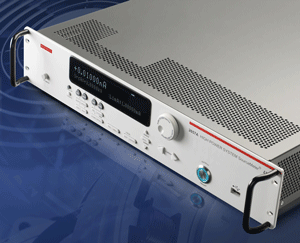- News
22 March 2012
Keithley launches high-voltage System SourceMeter for high-power semiconductor test
 Electrical test instrument and system provider Keithley Instruments Inc of Cleveland, OH, USA has launched the Model 2657A High Power System SourceMeter, which adds high voltage to the Series 2600A System SourceMeter family of high-speed, precision source measurement units. Together, the instruments allow the characterization of an even broader range of power semiconductor devices and materials, says the firm.
Electrical test instrument and system provider Keithley Instruments Inc of Cleveland, OH, USA has launched the Model 2657A High Power System SourceMeter, which adds high voltage to the Series 2600A System SourceMeter family of high-speed, precision source measurement units. Together, the instruments allow the characterization of an even broader range of power semiconductor devices and materials, says the firm.
A built-in 3000V, 180W source allows the Model 2657A to source up to five times as much power to a device under test (DUT) as the nearest competitive system, at significantly lower cost, it is claimed. The precision, high-speed 6-1/2-digit measurement engine built into the Model 2657A enables 1fA (femtoamp) current measurement resolution to support the low-leakage requirements of next-generation power semiconductor devices, the firm adds.
The Model 2657A is optimized for high-voltage applications such as testing power semiconductor devices, including diodes, field-effect transistors (FETs) and insulated-gate bipolar transistors (IGBTs), as well as characterizing newer materials such as gallium nitride (GaN), silicon carbide (SiC) and other compound semiconductor materials and devices. It is also useful for characterizing high-speed transients and performing breakdown and leakage tests on electronic devices at up to 3000V.
Like the rest of the Series 2600A family, the Model 2657A has a highly flexible, four-quadrant voltage and current source/load coupled with precision voltage and current meters. It combines the functionality of multiple instruments in a single full-rack enclosure - semiconductor characterization instrument, precision power supply, true current source, 6-1/2-digit DMM (digital multimeter), arbitrary waveform generator, voltage or current pulse generator, electronic load, and trigger controller - and is fully expandable into a multi-channel, tightly synchronized system via Keithley’s TSP-Link technology. The firm claims that, unlike competitive solutions, which are typically limited in terms of power, the Model 2657A can source or sink up to 180W of DC power (±3000V@20mA, ±1500V@120mA). The 1fA resolution also allows it to make fast, accurate sub-picoamp measurements even when sourcing up to 3000V.
The Model 2657A provides a choice of digitizing or integrating measurement modes for characterizing both transient and steady-state behavior, including rapidly changing thermal effects. Each mode is defined by two independent analog-to-digital (A/D) converters — one for current and the other for voltage — that run simultaneously to ensure accurate source readback without sacrificing test throughput. The digitizing measurement mode’s 18-bit A/D converters support one-microsecond-per-point sampling, so users can capture voltage and current transients simultaneously. In contrast, competing solutions typically must average multiple readings to produce a result, so they are not fast enough to characterize transient behavior. The integrating measurement mode, based on 22-bit A/D converters and common to all Series 2600A instruments, optimizes the Model 2657A’s operation for applications that demand the highest measurement accuracy and resolution. Keithley says that this ensures extremely precise measurements of the very low currents and high voltages common in next-generation power semiconductor devices.
Basic device characterization can be performed with no need for software installation or programming with TSP Express (Keithley’s LXI-based I-V test software utility). Users can simply connect a PC to the LXI LAN port and access TSP Express with any Java-enabled web browser. Test results can be viewed in either graphical or tabular format and then exported to a .csv file for use with spreadsheet applications. Two additional tools for creating test sequences are provided: the Test Script Builder application (for creating, modifying, debugging, running, and managing TSP scripts) and an IVI-based LabVIEW driver (to simplify integrating the Model 2657A into LabVIEW test sequences). The Test Script Builder application has new debugging capabilities that make test program development easier and more productive.
ACS Basic Edition software is also available as an option for component characterization. The latest release offers a set of features for characterizing high-voltage and high-current components. The included measurement libraries have been updated to support both DC and pulse-mode operation of both the high-voltage Model 2657A and high-current Model 2651A High Power System SourceMeter instruments. These libraries address a variety of power devices, including FETs, BJTs, diodes, IGBTs etc with tests that include input, output, and transfer characteristics on most devices. A special ‘Trace Mode’ provides real-time control over an instrument’s voltage or current output using a simple slider.
The Model 2657A can be connected to other instruments in a test system with standard safe high-voltage (SHV) coaxial cable connections compatible with existing high-voltage test applications. However, for applications that depend on getting the most from the instrument’s low-current measurement performance, Keithley also offers special HV triaxial (guarded) connections to optimize the Model 2657A’s measurement accuracy.
The optional new Model 8010 High Power Device Test Fixture provides connections for testing packaged high-power devices at up to 3000V or 100A, making it safer and simpler to configure a device test system that includes the high-voltage Model 2657A, one or two high-current Model 2651A instruments, and up to three low-power SMU instruments (other Series 2600A instruments or the Model 4200-SCS semiconductor characterization system). In addition to standard banana jumpers, the Model 8010 has rear-panel oscilloscope and thermal probe ports to simplify system integration for further DUT characterization. The Model 8010 has full safety interlock capability. To prevent instrument damage if a device fault occurs, integrated protection circuits in the Model 8010 safeguard the inputs of the lower-voltage Series 2600A instruments from the high voltages that the Model 2657A can output. Individual protection modules are also available to simplify connecting multiple SMUs safely to a third-party probe station, component handler, or other test fixture.
Shipments of the Model 2657A will begin in May, with lead times of two weeks ARO.
Keithley Semiconductor test instrument
